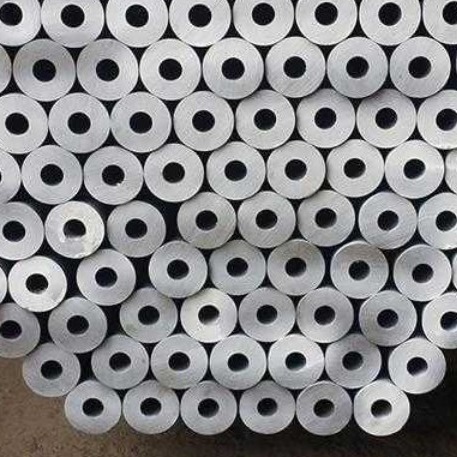Project Description
Sanbar 64 Hollow Drill Steel
Sanbar 64 is an air-hardening, high nickel alloy steel with good response to carburizing. It has excellent fatigue strength and wear resistance in the case hardened condition.
Chemical composition (nominal)
| Chemical composition (nominal) % | |||||||
| C | Si | Mn | P | S | Cr | Ni | Mo |
| 0.22 | 0.3 | 0.7 | ≤0.020 | ≤0.025 | 1.3 | 2.9 | 0.2 |
Applications
Sanbar® 64 is used for extension rods, shank rods and tapered rods.
Forms of supply
Hollow drill steel is supplied as hollow, hot-rolled, round or hexagon bar. The ends are trimmed square to within 0.15 mm (0.006 in.) maximum.
Surface condition and protection
Both the outer and inner surfaces are free from harmful slag marks, cracks and scratches. The maximum depth of defects is 0.20 mm (0.008 in.) on the outer surface and 0.15 mm (0.006 in.) on the inner surface.
The outer surface can be supplied dry or oiled for protection against corrosion during transportation. The flushing holes are normally sealed with plastic caps.
Straightness
Maximum deviation is 1 mm per 1000 mm (0.04 in. per 39.4 in.).
Fixed lengths
Fixed lengths can be supplied upon request. The length tolerance for fixed lengths are:
| Lengths, mm (in.) | Tolerance, mm (in.) |
| ≤ 3375 (132.87) | +/- 2 (0.0787) |
| 3376-5750 (132.91-226.38) | +/- 3 (0.1181) |
| > 5750 (226.38) | +/- 4 (0.1575) |
Bars are supplied in standard bundles containing max 1500 kg (3300 lbs).
Mechanical properties
| As-delivered condition, typical values
Proof strength |
Tensile strength | Hardness |
| Rp0.2 | Rm | HRC |
| MPa (ksi) | MPa (ksi) | |
| 900 (131) | 1250 (181) | 37-44 |
Decarburization
The maximum permissible decarburization depth is 0.30 mm (0.012 in.) on the outer surface and 0.20 mm (0.008 in.) on the inner surface.
Machining
Sanbar® 64 can be machined in the hot rolled condition.
Forging
Induction heating to 1000–1100°C (1830–2010°F), 10–60 seconds, depending on dimension. Forging range 1100–850°C (2010–1560°F).
Heat treatment
Annealing (induction heating) 680–720°C (1260–1330°F). Cooling in air.
Read more about heat treatment of Sanbar® 64 under Fabrication.
Gas carburizing and direct quenching
920–930°C (1690–1705°F). Time depends on the required carbon content and the case depth. Cooling in forced air.
Tempering
Recommended surface hardness 57–62 HRC and core hardness 36–44 HRC temperature appr. 180–230°C (355–450°F) for one hour.
Surface induction hardening
Hardening
Hardening: Induction heating to 900– 1000°C (1650–1830°F), 3-6 seconds. Quenching in water or in oil.
Tempering
Recommended surface hardness 50–55 HRC, temperature 150 to 250°C (300– 480°F). Tempering may not be needed.
Forging
Sanbar® 64 requires rapid heating to the forging temperature and, above all, the soaking time at full temperature should be as short as possible. This will minimize grain growth and decarburization, both of which drastically impair the fatigue strength. Heat the rod end locally to the correct forging temperature. Forge within the temperature range specified for Sanbar® 64.
Heat treatment
Overall gas carburizing gives Sanbar® 64 excellent fatigue strength and wear resistant properties. It is very important to control the atmosphere in the furnace by having a stable gas flow and an even temperature. The recommended surface carbon content is 0.5 to 0.7%. To increase the toughness, tempering needs to be carried out immediately after carburizing, according to the recommendations above.
The required case depth must be a function of the thread dimension but is in the area of 0.6 to 1.2 mm (0.020 to 0.057 in.). It is essential to ensure that rods are carburized internally in order to obtain maximum service life. The absence of internal carburizing can be extremely detrimental, especially in corrosive environments. In some applications, e.g. surface drilling in poor conditions, surface induction hardening, carried out according to the recommendations above, can be an alternative to overall carburizing.
The required case depth must be a function of the thread dimension but is in the area of 1.5 to 3 mm (0.06 to 0.12 in.).
Shot peening
Shot peening of an adequate intensity and coverage is recommended. It improves fatigue strength due to:
Introduced compressive stresses
Increased hardness
Smoother surface defects
Corrosion protection
Corrosion of a material subjected to fluctuating loads accelerates the fatigue process. In underground applications particularly, products should be protected to avoid premature fatigue breakages starting from the hole surface.
We are committed to integrate steel resources in china and serve the global steel market. Our company has more than 15 years of experience in steel researching, production, managing and sales. And our team mostly are based on and worked in national famous steel enterprise before. In the aspect of resources and information, we have established cooperative relationship with nearly hundred enterprises, either state-owned or private owned in China.

What’s more, we have built long, deep and close business relationship with dozens of steel company, Sharing and holding equities with several steel enterprises. Because of the close cooperation with steel companies and our pioneering spirit, which can ensure us stay at the top competition, and ensure our customers get what they really want. We provide preffesional one-stop service to the Contractors of follows project:
- Oil and Gas Pipeline Construction
- Onshore and Offshore
- Boiler Manufacturers
- Oil Refining Equipment
- Petroleum and Chemical Plant Construction
- Fire Protection
- Heating & Air Conditioning

Our ability to purchase materials directly from leading mills at the best possible price will give you the competitive edge. This coupled with a skilled workforce dedicated to embracing the demands of the markets we serve. Just give us a call +86-731-89903933.


